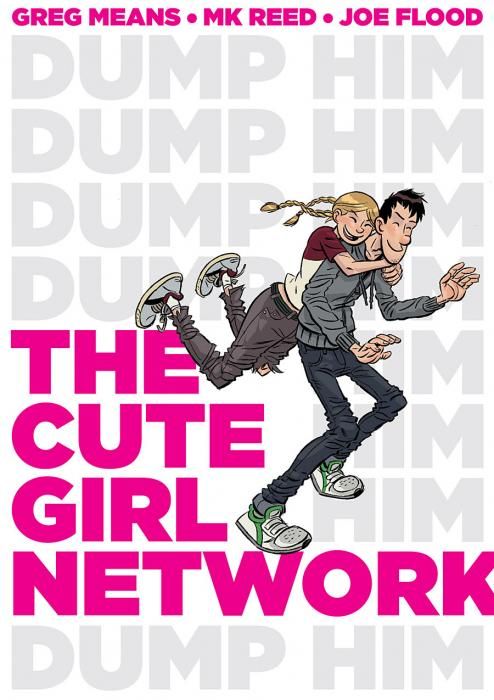If I had to pick one word to describe "The Cute Girl Network" it would be -- well, cute. This breezy, adorable book manages to poke fun at conventional your-friends-know-best dating wisdom without ever veering into unattractive misogyny. The characters and situations feel comfortably familiar, even at their most hyperbolic, and it makes the tired will-they-won't-they storyline feel surprisingly fresh and relevant.
When skater girl Jane falls for sad sack Jack, her friends rush to intervene, summoning the Cute Girl Network for stories from all of his exes. It's a fun romp through his past mess-ups and their present courtship, with cartoony, characterful art that brings a lot of joy to the scenes.
Admittedly, Jack is almost unbelievably stupid, and Jane hits on a lot of "super-cool skater chick" cliches. But in a reversal of typical reviewer priorities, even when this book gets some of the bigger things wrong, it gets so many of the little things right that I remained delighted. For instance, in order to demonstrate just what sort of women Jane hangs out with, Reed and Means introduce them holding an ironic reading of this universe's "Twilight" over bottles of wine. The soup cart has seasonal specialties. The coffee shop is called a 'Bagelarium.' As a portrait of a very particular slice of urban liberal early adulthood, it's so well captured.
In addition, Jane's experience as a woman in the skating world was incredibly relevant to lady nerds. When she finally explodes at a guy who's just called her the skater equivalent of a Fake Geek Girl -- "Do you think this is the first time I've had this conversation? Do you think it's even the hundredth?" -- any reader who's ever had a similar experience will want to shout 'Amen!'
I still came away from it confused as to why Jane likes Jack, but that's probably because the character I most delighted in and related to was Harriet. An insufferable harpy myself, I loved her lines like "I will pay him to have a vasectomy," and "Of course you like her. She's awesome, and you're a piece of [three guesses, dear reader].
Still, even at their harshest, Jane's unwanted helpers are treated sympathetically. When they say something absurd or judgmental, it's followed by an earnest and relatable line: "I just don't want you to wreck your life with a boy who isn't good enough for you." There's a very human balance to them and their concern for their friend, even when they don't recognize how arbitrary their ideas of "good enough" are.
The same can't be said for Jack's roommates Gil and Rose, probably the most carelessly rendered characters in the book. Neither of them seems to have been given any special attention. They have a fascinating living situation that could have been explored, and for all that Gil seems like a stereotypical bro, he watches out for Jack in his own misguided way. None of that gets touched on, which was sad when the female relationships are done so well.
I should mention that there were a few insensitive lines that bordered on being at the expense of the developmentally disabled, and they were jarring in a book that otherwise feels so kind. It's a pity they weren't edited out.
In the end, both Jane's female friends and her male co-workers are forced to reject and revise their gender stereotypes. Jane's co-workers at the skate shop learn not to underestimate and otherize women. Her friends learn that collective female wisdom isn't infallible and all-knowing. And even with all these lofty lessons, the book still ends with "Look, those two monkeys are totally doin' it!"
What a treat.

